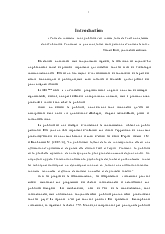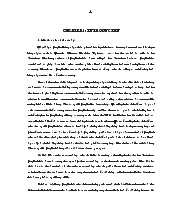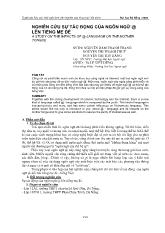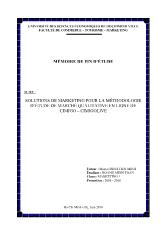Aims to investigate and draw out the politeness strategies manifested in advising in English and Vietnamese
- Người chia sẻ : vtlong
- Số trang : 42 trang
- Lượt xem : 10
- Lượt tải : 500
- Tất cả luận văn được sưu tầm từ nhiều nguồn, chúng tôi không chịu trách nhiệm bản quyền nếu bạn sử dụng vào mục đích thương mại
Bạn đang xem trước 20 trang tài liệu Aims to investigate and draw out the politeness strategies manifested in advising in English and Vietnamese, để xem tài liệu hoàn chỉnh bạn click vào nút DOWNLOAD LUẬN VĂN ở trên
English has played a vital role in society and madeconsiderable contribution to education,
culture, science and technology. The number of people learning English for various
purposes (such as for job, business, traveling ) iscontinually on the increase everyday.
Therefore different kinds of English teaching and learning materials are available over the
world, especially in Vietnam.
In our country, English has been regarded as the most important foreign language
nowadays, especially since the Vietnamese Government carried out the open door policy.
English has been taught for a long time in Vietnam.It becomes a compulsory subject in
most universities and schools throughout the country. However, the emphasis on
transmission of structural rules and forms often sever as the principal method of teaching
English in Vietnamese schools and universities. Most of Vietnamese teacher tends to focus
on teaching as much grammar and vocabulary as possible. In fact, this method cannot do
much help for students to assure a successful communication in daily life. The students
may get difficulty in achieving contextual, situational and cultural appropriateness in
communication. Therefore, the failure or the cultural breakdown might easily happen in
oral communication even though they learn English grammar well.
Thus, cultural knowledge is obviously an important key for Vietnamese students to
succeed in learning English because second languagelearning is second culture learning.
In order to acquire the second language, English, it is necessary to learn not only linguistic
knowledge and interaction skills but also knowledgeof culture. When understanding the
cultural factors students may have chances to expose themselves to native speaking
environments. Normally Vietnamese students tend to employ English based on their native
culture and cause misinterpretation in oral communication. They are sometimes impolite,
unfriendly or even hostile by chance. Hence, to communicate well across culture students
must be aware of their own culture as well as the English culture, especially the hidden
part of culture including politeness and politenessstrategies, which is really important part
in all social interaction.




